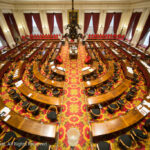Senate Working to Mitigate Property Tax Increases Below 13%
The Senate Finance Committee only had one week to work on a critical bill which, as passed by the House, would raise property taxes by 15-18%, create a cloud tax (including software as a service, infrastructure as a service, and platform as a service), and add a 1.5% surcharge to short term rentals. The Chair of the committee, Ann Cummings (D-Washington) continues to be a champion for balance and well-informed policymaking this session and is working to get the property tax increase below 13%. She is taking a measured approach to the issue, with an understanding that raising other taxes to achieve this would also have implications.
One measure under discussion is leveraging the influx of general fund revenue from the solar eclipse to buy down $25 million. An additional proposal is borrowing $20 million from our reserves. However, the Treasurer is scheduled to testify later today that using reserve funds would pose a risk to Vermont’s credit rating. He previously testified in the House Ways in Means Committee on these concerns. The Senate Finance Committee is also considering a handful of sales taxes on items such as candy, sugar-sweetened beverages, clothing over $150, and vaping tobacco. Separately, following business testimony on the anticipated cost and complexity of a widespread cloud tax, the committee appears ready to scale back the House proposal to a tax on software as a service. The committee is expected to work late into this evening to ensure they vote the bill out.
Earlier this week, the committee considered transitioning from the proposed 1.5% short-term rental tax to a .5% rooms tax increase. The Vermont Chamber and members of the lodging community voiced concerns that another tax increase on the lodging industry could have far-reaching ramifications for the visitor economy. Kim Donahue, Owner of the Inn at the Round Barn Farm, testified that for every dollar spent at her business, visitors spend another $4 at neighboring businesses. These figures are particularly notable at scale when even a slight increase in taxation could redirect major events like wedding spending to neighboring states, jeopardizing Vermont’s competitiveness.
RECENT TAX NEWS




